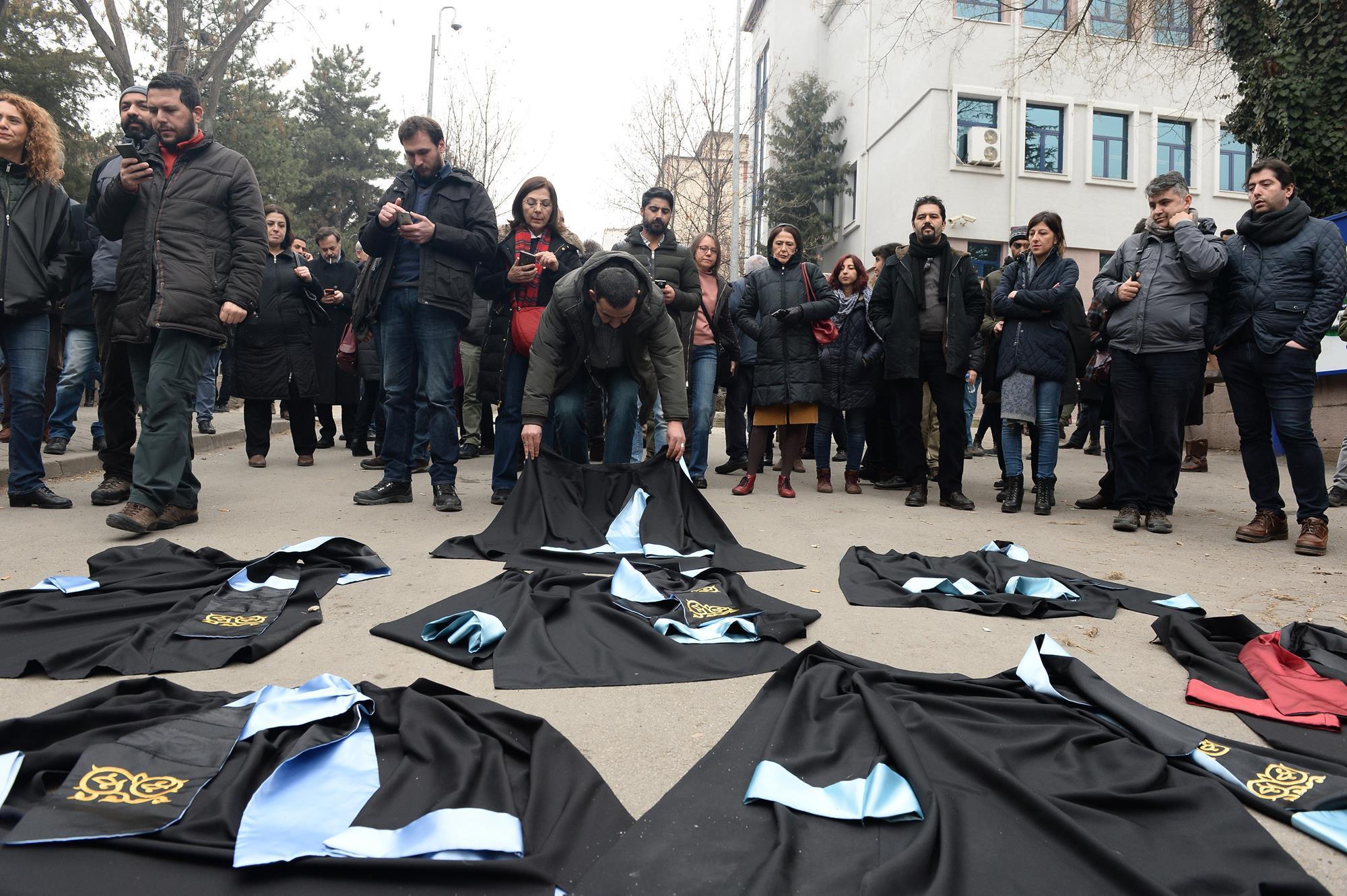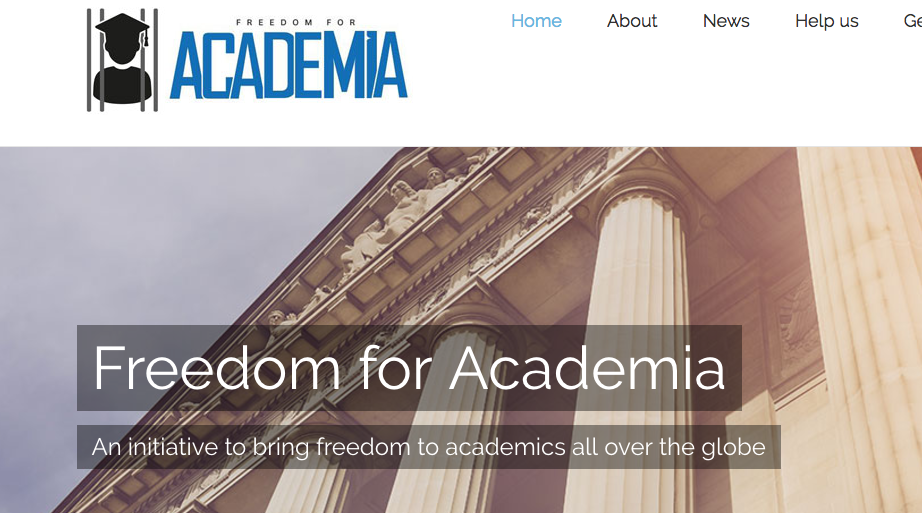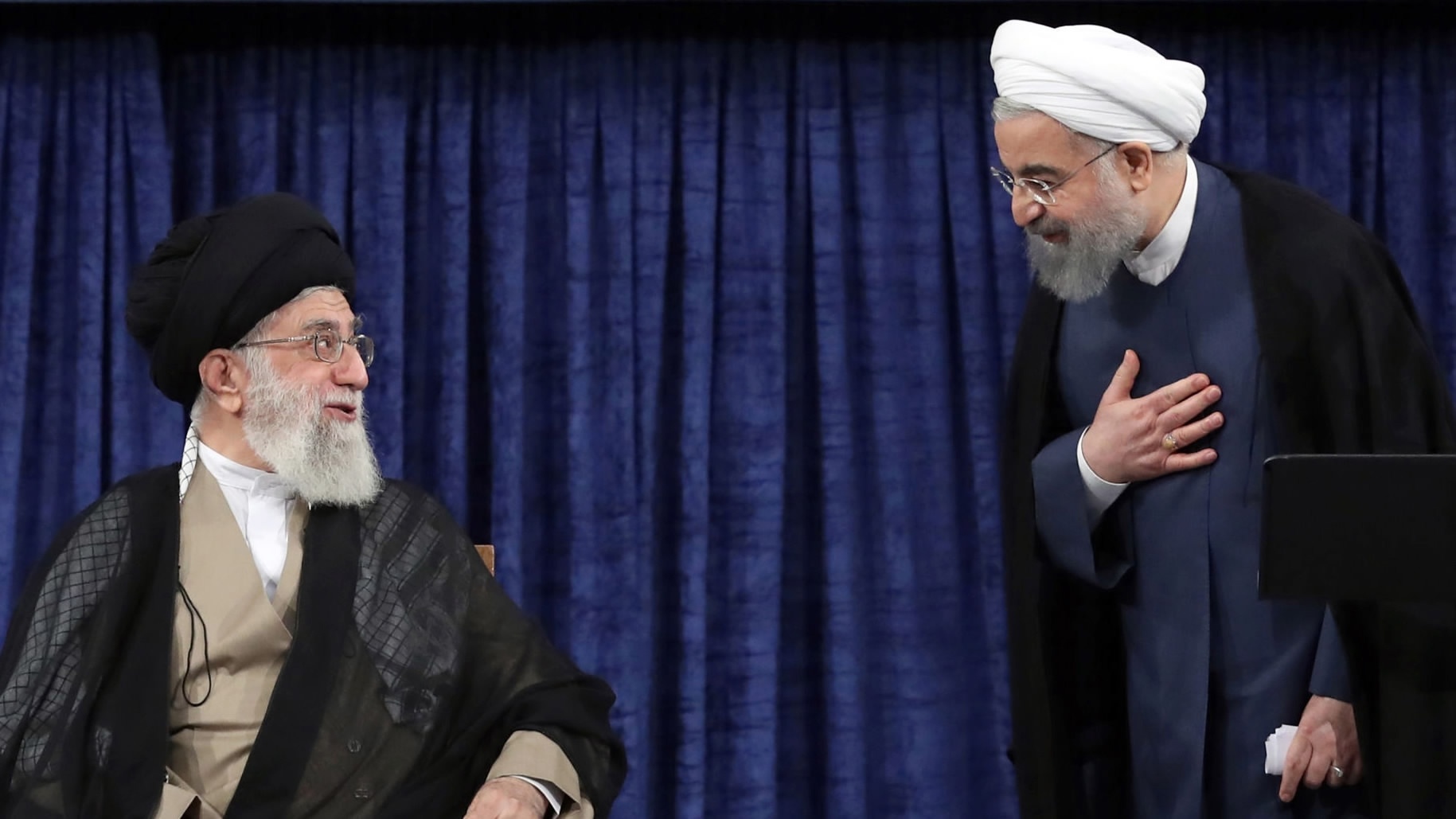
The crackdown on the freedom of expression and dissent since the failed coup in July 15 last year has reached epic proportions in Turkey.
The effects of the continuous severe blows to journalism is by now well known. Another area where the oppressive measures intensely focus is the academia, where the very existence of independent research is endangered to maximum.
What are the effects of the state of emergency, which was launched in July 20 last year, on the universities so far?
”The Justice and Development Party (AKP) government under the strict rule of Turkey’s autocratic President Recep Tayyip Erdoğan has sacked more than 8,000 critical academics and led to 28 percent decrease in academic output since the failed coup attempt on July 15, 2016, showed a report released by a London-based research group focusing on the sufferings of the academicians in Turkey under the successive state of emergencies”
reported the Stockholm Center for Freedom (SCF), a monitoring website based in Sweden.

The survey is done by Freedom for Academia, a group of British and Turkish academics/researchers willing to lend a helping hand to their colleagues and bring the injustices to the attention of the global public and academic circles. They also aim to liaise and cooperate with other groups believing in similar principles and help them help other persecuted academics.
Here are the details, as reported by SCF:
”The study, conducted by Freedom for Academia, has shown the short-term effects of the large-scale purges carried out by the autocratic Erdoğan regime targeting Turkey-based academics. According to the study, purge of more than 8,000 academicians in Turkey has resulted in many universities and academic departments to close – leaving many students without lecturers, many hospitals to be left with a lack of key personnel, and many scientific projects funded by the state to come to an abrupt end.
The survey has also shown that the large-scale dismissal of academics has had effects on the research outputs of Turkey-based academics with a significant reduction (~28% on average) in the research output of Turkey-based academics in 2017 regardless of academic field. The study has also stated that the long-term effects of the draconian measures taken by the government on Turkey-based research and academia remains to be seen.
Stressing that the AKP government wasted no time in using the coup attempt as an excuse to suppress all dissent, the survey figures out how the government has purged tens of thousands of public employees including academics.
“All those purged lost their right to work in any public institution and had their passports cancelled – thus could not travel abroad to find work. Most of those purged were either imprisoned and/or detained for at least a certain amount of time. Some have even had their assets seized and/or bank accounts frozen. Gross human rights violations were reported, with concrete evidence for physical, psychological, and emotional torture in prisons,” said the survey.
With the numerous executive decrees over 8,000 academicians have been purged, Freedom for Academia stated that “Apart from the universities that have been shut down entirely, these large-scale purges have led to many academic departments to close and leaving many students without lecturers, many hospitals left with a lack of key personnel as many medical academics were also serving part-time, and many projects funded by the state to come to an abrupt end. Consequently, these changes have had negative psychological, emotional, and social effects on the population, but also had an impact on the research output of Turkey-based academics.”
The survey identified there was a significant decrease of 28 percent on average in the number of research outputs of Turkey-based academics in 2017, regardless of the academic field.
According to the survey results the most affected fields were the Social Sciences, and Medicine, with a total reduction of 44 percent and 36 percent in the number of published articles by Turkey-based academics, respectively.
Freedom for Academia has stated that this sharp decline in the research output in 2017 compared to 2016 becomes more striking when 2012, 2013, 2014 and 2015 figures are brought into the equation, as a stable upward trend in the research output of Turkey-based academics was observed in this time period (excluding 2017) – with, on average of 5 percent more articles being published compared to the previous year, every year, across all fields.
Before the purges Turkey had about 150,000 academics, including by 22,000 Professors, about 14,500 Associate Professors and about 34,000 Assistant Professors. With a series of decrees, the AKP government purged as of May 15, 2017 over 8,300 academics, which is 6 percent of all academicians in Turkey.
Emphasizing over the fact that the AKP government has mainly targeted influential critics including prominent academics such as 82-year-old Prof. Öget Öktem-Tanör (Neuropsychology), Prof. Sedat Laçiner (Political Sciences), Prof. Mehmet Altan (Economics), Prof. İbrahim Kaboğlu (Constitutional Law), Prof. A. Özdemir Aktan (General Surgery), Prof. Melek Göregenli (Social Psychology), Prof. Ayşe Gül Yılgör (Economics and Administration), Prof. Haluk A. Savaş (Psychotherapy) and Prof. Ayşegül Jale Saraç (Physiotherapy), Freedom for Academia said that this figure is likely to be an underestimate within the more senior positions.
Freedom for Academia has also warned that, “it is conceivable that the long-term effects may be more catastrophic for Turkey-based research and science because many academics who have not been sacked still fear for their jobs (and imprisonment, as mentioned above, many who have been sacked are in prison) as many of them are being monitored by overzealous university rectors and deans. Carrying out research has therefore become secondary to numerous academics, and many who have the capacity are looking for jobs abroad; and this is bound to lead to a ‘brain drain’, detrimental to the country’s higher education and science systems.”
According to a report by the state-run Anadolu news agency on May 28, quoting Bekir Bozdağ, Turkish Minister of Justice, 154,694 individuals have been arrested and 50,136 have been sent to pretrial detention due to alleged Gülenist and/or PKK links since the failed coup attempt.
In a separate blog (dedicated to a purged Turkish scholar who committed suicide), Umut Özkırımlı- an academic based in University of Lund, Sweden puts the picture in a broader context:
”Turkish government’s ‘war on academe’ is neither unique nor new. Anti-intellectualism has been the hallmark of authoritarian or totalitarian regimes, past and present, left and right, and a defining feature of populism—the dreary buzzword of the times we live in.
Not a day passes by without a politician or a pundit targeting reputable institutions of higher education or chastizing ‘sneering liberal elites’, ‘Leftist academics’, ‘SocJus Activists’, whether it is Viktor Orbán pushing for a bill that would force Central European University in Budapest to close its doors, Donald J. Trump accusing Global Warming scientists ‘to be stuck in ice’, Michael Gove (a leading figure of the Brexit campaign) declaring ‘People in this country have had enough of experts’, to name but a few… the case of Turkey (must be seen) as part of a global attack on academic freedom, an attack that could only be countered by developing transnational networks of solidarity firmly grounded precisely in those values that the likes of Erdoğan, Orbán, May, Trump, and their ideological kith and kin across the world are determined to eradicate.”
What to do? Many academicians – especially those who are part of a remarkable exodus, reminiscent of the days in 1930’s Germany – seem not willing to let go quietly. They are determined to combat forgetting, by way of enhancing the campaign against what they see as tyrannical methods.
A group of widely persecuted ‘Academics for Peace’ have mot recently launched a worldwide call for ‘academic boycott of Turkey’, with the slogan ‘Do not be a part of the crimes in Turkish higher education’.
Here are some of the reasons:
*University Rectors encourage staff and students to spy on and incriminate academics suspected of a critical stance towards the government, particularly the signatories of the Academic for Peace declaration;
*A young academic, Dr Mehmet Fatih Traş, committed suicide after his contract at Çukurova University was terminated and his job applications to several universities were turned down on the grounds that he is a security risk;
*Graffiti on academic staff office doors, hate speech and criminal threats against critical academics have become wide-spread practices used and tolerated on- and off-campus;
*Students supporting dismissed lecturers are persecuted and dismissed;
*The Higher Education Council (YÖK) and the University Rectors work with, and upon instructions from, the National Intelligence Agency and the police to draw lists of academics to be dismissed;
*Lists of dismissals are approved by the government and the President; and implemented via state of emergency decrees without the right for appeal;
*The government-controlled publisher of academic journals (the National Academic Network and Information Centre – ULAKBIM) has instructed journal editors to remove Academics for Peace signatories from editorial and reviewer boards;
*Conference organizers are excluding dismissed Academics for Peace from conferences, seminars and workshops under threats from and/or in collaboration with the government and higher education bodies;
*The government-controlled Scientific and Technological Research Council of Turkey (TÜBİTAK) has: (a) terminated existing grants to and rejected funding applications by Academics for Peace; (b) terminated the scholarships to PhD students who signed the Academics for Peace declaration while researching in universities outside Turkey; (c) forced funded PhD students to submit statements on their research with a view to ensure that their research does not harm national interests; (d) forced Academics for Peace signatories to withdraw their names from published or under-review work that it had funded in the past; and (e) stopped printing books on the theory of evolution and has increased support for shady ‘research’ projects that champion creationism.”
Therefore, the petitioners concluded;
‘We call on all institutions of higher education, funding councils, academic and professional associations, and individual faculty members to boycott the Turkish higher education system. The aim of the academic boycott is ensuring that all dismissals are revoked and the persecution of academics, exacerbated under the state of emergency regime, is ended. The boycott is targeted against complicit universities and higher education institutions as follows’:
*Declare a moratorium on ALL future collaborations with the Higher Education Council (YÖK) and the Scientific and Technological Research Council of Turkey (TÜBİTAK), who violated the right for academic freedom and betrayed the international norms on higher education;
*Declare a moratorium on ALL future collaborations with rectors of the complicit universities, who not only violated the right for academic freedom and betrayed the international norms on higher education, but also acted like an extended arm of the intelligence agencies in their universities;
*Suspend the membership of all YÖK and TÜBİTAK officials and of all complicit university rectors in professional, business and educational associations;
*Declare a moratorium on ALL future research collaborations with ANY complicit university (list at: link);
*Declare a moratorium on ATTENDING ANY future academic or professional conference/workshop/seminar sponsored and/or co-organised by or held at YÖK, TÜBİTAK or any of the complicit universities in Turkey and elsewhere;
*Declare a moratorium on HOLDING or ORGANISING ANY future academic or professional conference/workshop/seminar at any of the complicit universities in Turkey.



